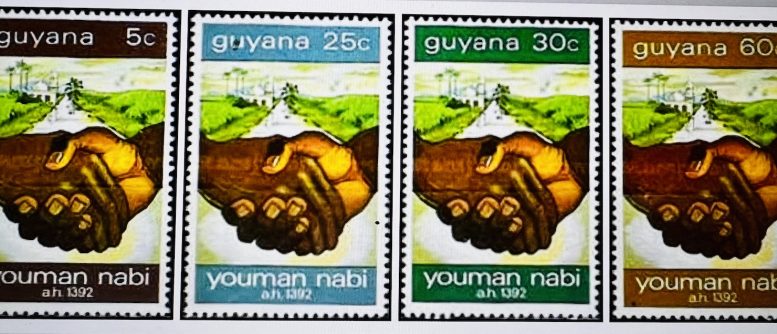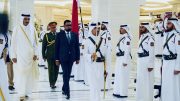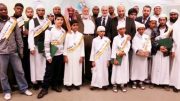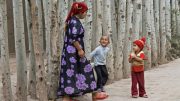Little is known about what may have inspired J. Chriswick to design Guyana’s 1972 “Youman Nabi” postage stamp using the apt motif of a simple handshake. The handshake is a universal symbol of trust, acceptance, dignity and heartfelt respect. This is why a Muslim might instinctively touch his chest (heart) with his right hand after a handshake, even with a person of another faith.
From the early days of our country’s independence, Youman Nabi sometimes referred to as Milad An-Nabi, which marks the birth anniversary of Prophet Muhammad, was adopted as a national holiday. Contrary to the Ministry of Education’s Grade Five, term 2 social studies worksheet, Muslims “do not” celebrate the death anniversary of Prophet Muhammad; may the peace and blessings of God be upon him.
There is a great deal to celebrate about the life of Prophet Muhammad, and perhaps that’s why the leaders of the very divided United Sadr Islamic Anjuman, along with prominent scholars and Imams, unanimously agreed to petition the National Assembly to declare Youman Nabi as a national holiday.
Youman Nabi is observed according to the hijri calendar, which means that Muslims will gather at their local masjids on the 12th day of the third lunar month, known as Rabia’al Awwal, to recite poetry in honour of God and His Prophet. This genre of religious poetry is sometimes referred to as “qasidas”, which are customarily sung in the Urdu language. Today, one will likely hear qasidas being recited in Arabic, Persian and even English at gatherings across the country.
The Youman Nabi was once a major celebration that forged togetherness of purpose in faith and love. However, there has been a tamping down of the joy that normally permeates the occasion. Today, prominent Guyanese Muslim organizations and religious activists continue to wage a smear campaign against the Youman Nabi. Despite repeated demands, the naysayers have refused to put their objections in writing, making it impossible for anyone to properly respond. Instead, they whisper their disagreements in hushed tones behind closed institutional doors.
This is unfortunate because the Prophetic message of diversity and equity, his promotion of fairness, justice and equal opportunities for all regardless of race, class or ethnicity, is still relevant today as it was in the past. Whether in the 13 years he spent in Mecca or the 10 years in the city of Madina, the Prophet Muhammad demonstrated a firm commitment to creating an inclusive society.
The names of his illustrious companions don’t immediately reveal their ethnic identities, and neither should it matter. Needless to say, the Prophet’s community was not monolithic, nor was it a mono-cultural society.
Those closest to him were blessed women such as Umm Ayman, whose real name was Barakah, a Black woman. She buried the mother of the Prophet in Al-Abwah between Mecca and Madina and brought the six-year-old baby Muhammad back to Mecca, cradled in her arms. Sumayyah bint Khayyat was also a Black woman who was married to Yassir; both killed for believing and following Prophet Muhammad.
Miqdad ibn Amr from Hadramawt, Yemen and Abu Dharr from the tribe of Ghifar are described as brown-skinned. Julaybib, a companion with dwarfism, was beloved by Prophet Muhammad, and he buried him with his own hands. Eight converts, including a former Jewish Rabbi, migrated from Abyssinia to Madina to join the community of the Prophet. Salman al-Farsi was Persian, and Suhayb al-Rumi was from the heart of the Roman Empire. And lest we forget, Bilal, the tortured African and beloved companion of the Arabian Prophet, who not only called others to five daily prayers (muezzin), but was also the exchequer of Bait-ul-Maal, the most vital charitable institution in Madina. The list of Prophetic companions who enriched the community with their diversity includes Abu Nizar, the son of Najashi, Emperor of Abyssinia, who converted to Islam and migrated to Madina, where he became the caretaker of a garden owned by the prophetic household named al-Buyhaygha. His son, Nasr, accompanied the grandson of the Prophet when he left Madina. They were all tragically martyred at Karbala.
If some Muslims object to the singing of qasidas in Urdu, it might still be a good idea to utilize the holiday before losing it, if only to rejoice at the birth and reflect on the life of a Prophet whom God described in the Quran as a Messenger that “was sent as a mercy to all of mankind” and who “embodied the most perfect character.”




